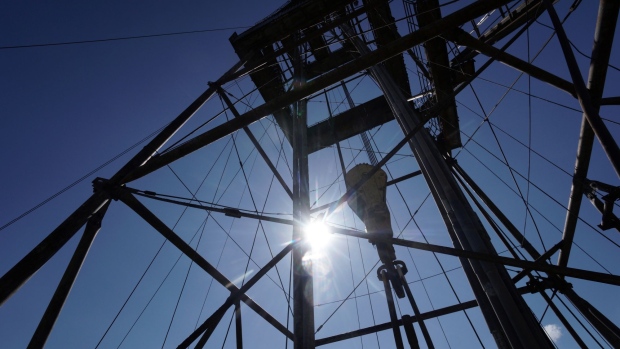Sep 12, 2022
Nigeria’s Seplat Spent $450 Million With Firms Tied to Founders
, Bloomberg News

(Bloomberg) -- One of Nigeria’s largest independent oil and gas producers spent more than $450 million on goods and services provided by companies linked to its two founders over 12 years, most of it after the firm publicly listed in London and Lagos in 2014.
Seplat Energy Plc, which could be set for a major expansion after agreeing on a deal with Exxon Mobil Corp., made the payments to 18 companies associated with former Chairman Ambrosie Bryant Orjiako and former Chief Executive Officer Austin Avuru, according to the firm’s annual reports. The businesses supplied everything from drilling rigs to gift baskets, and some were connected to family members of the two men, the reports show.
The transactions started in 2010 and ended in 2021, when the board voted to phase out transactions with “related parties,” according to the annual reports. Payments to these companies peaked in 2014 at almost $106 million, or 13.6% of annual revenue. They exceeded a 10th of total income during 2015 and 2016, after which the volume of transactions declined, besides an uptick in 2019.
In response to questions from Bloomberg, Avuru said he and his business partner founded the two biggest recipients of contracts with Seplat specifically to help the company meet its ambitious drilling targets and reduce logistical costs. Orjiako did not respond to requests for comment. Seplat declined to comment.
Nigerian Champion
Orjiako and Avuru, both well-known businessmen in Nigeria, created Seplat through the merger of two of their companies in 2009. After the five international oil majors active in the West African country, the Lagos-based firm competes with Indian-owned Sterling Oil Exploration & Energy Production Co. to be the largest producer of crude and natural gas. It pumps about 50,000 barrels of oil equivalent each day from a portfolio of eight onshore blocks.
In February, Seplat agreed to buy Exxon’s shallow water permits in Nigeria for at least $1.28 billion, a deal that would almost triple its production. The Nigerian National Petroleum Co. is trying to block the purchase and take over the licenses itself. Last month, President Muhammadu Buhari approved the transaction before swiftly reversing his decision and siding with a regulatory body’s rejection of the sale.
Of the $450.5 million of transactions Seplat has declared for goods and services with companies in which Orjiako, Avuru or their relatives have stakes, $283 million was paid since 2014 when the firm listed on the London and Nigerian stock exchanges, according to its annual reports.
Rig Shortage
Seplat’s founders co-owned the two largest beneficiaries: Cardinal Drilling Services Ltd, which provided drilling rigs, and Nerine Support Services Ltd, which supplied warehousing space as well as agency and contract workers. Cardinal and Nerine received $137.2 million and $121.5 million respectively, the reports show.
Avuru, Orjiako and Paris-listed Etablissements Maurel et Prom SA set up Cardinal about a decade ago to address a shortage of rigs in the Nigerian market, Avuru said by email. The new company acquired four land rigs exclusively for Seplat’s use, which enabled the producer to achieve an “aggressive drilling program” and nearly quadruple output between 2012 and 2015, he said.
Contracting was done “strictly at arms’ length and the rates were demonstrably competitive,” Avuru said.
Avuru and Orjiako created Nerine to tackle the “huge costs” and delays caused by using storage and logistical facilities run by a third-party contractor inherited from Shell Plc, from which Seplat had purchased its first licenses, Avuru said. Nerine built a new warehouse and supply base for Seplat that made savings of 60%, he said.
Family Connections
Other companies owned by Orjiako were paid tens of millions of dollars for diesel deliveries, construction work, consulting services and business development, according to the annual reports. A firm where his nephew is a director and shareholder received $59 million for engineering contracts, the reports say.
One of Avuru’s businesses charged nearly $14 million for transportation services, while companies in which his wife holds shares and where his sister was employed were paid for catering a staff canteen and supplying bespoke gift hampers.
In total, Seplat paid $410 million to companies associated with Orjiako and $299 million to those connected to Avuru over the 12-year period, according to its annual reports.
The savings provided to Seplat from Cardinal and Nerine were “beclouded” by their inclusion as related-party transactions in the company’s annual reports, Avuru said. These “negative sentiments” drove Seplat to eventually buy the rigs and the warehouse, he said.
Avuru retired as Seplat’s CEO in July 2020 and remained as a non-executive director until March this year. Orjiako stood down as the producer’s chairman in May, and will continue to assist Seplat with “specific and essential external stakeholder engagements,” the firm has said.
Orjiako and Avuru currently have stakes in Seplat of 6.4% and 8.4%, respectively, according to the annual report. Maurel et Prom is the largest shareholder, and declined to comment.
In March 2021, Seplat’s board, at the time still headed by Orjiako, announced the company would “eliminate” all related-party transactions by the end of last year. The then-chairman wrote that the decision was “a sign of our commitment to the highest standards of governance.”
Despite that policy change, in October 2021 Seplat transferred $36 million to Access Bank Plc to purchase four drilling rigs previously owned by Cardinal, resolving a lawsuit over defaulted loans filed by the bank against Seplat, Cardinal and Orjiako, according to Seplat’s 2021 annual report.
The company also paid $509,000 to the British Virgin Islands-registered firm that holds Orjiako’s shares for “consulting services” during the first six months of 2022, the company disclosed in July.
©2022 Bloomberg L.P.





